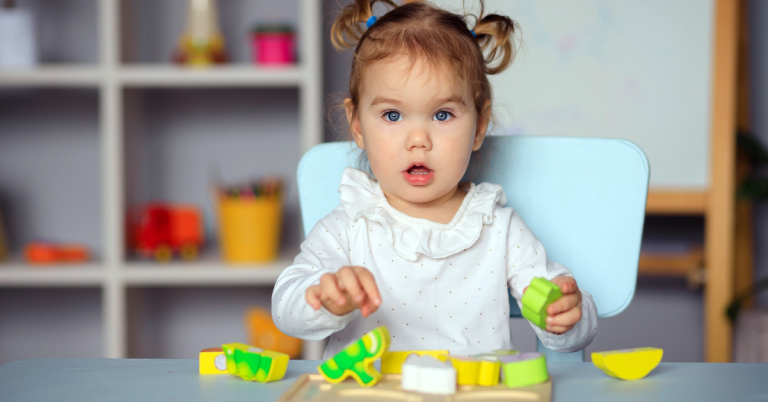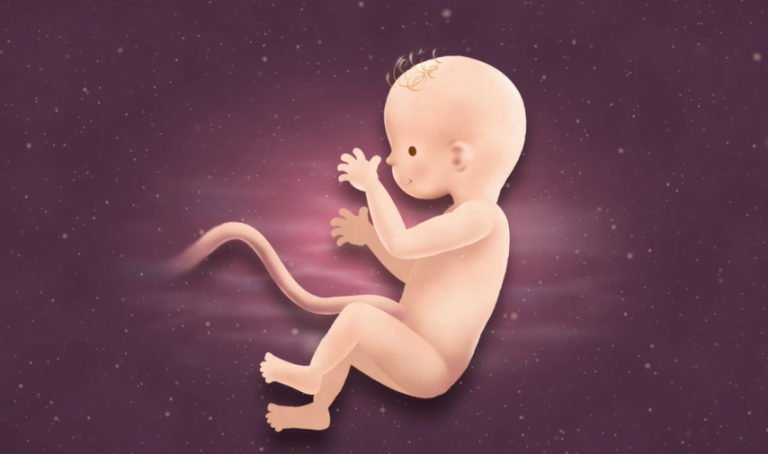Your baby is rapidly growing and is now fifteen months old. Isn’t it exciting and surprising that he is gaining new skills every day? Do you have any idea about the developmental milestones that your baby should reach this month? To help you monitor his development, we describe an average 15-month-old baby’s physical and mental development.
Measurements and Physical Development at 15 Months
After twelve months, your baby’s growth rate decreases. Because of his increased mobility, he spends more energy, which may even cause weight loss. You don’t need to worry about this. It is normal that your baby sometimes gains weight and then again loses some.
The table below shows 15-month-old babies’ average weight, length, and head circumference.
| Gender | Weight | Length | Head Circumference |
| Girl | 7.7 kg–12.2 kg | 72.4 cm–82.7 cm | 43.1 cm–48.2 cm |
| Boy | 8.4 kg–12.7 kg | 74.4 cm–83.9 cm | 44.3 cm–49.3 cm |
A baby’s growth is influenced by different factors, such as disease, teething, climate, and genetic factors. Your physician will regularly measure your baby’s length, weight and head circumference and help you interpret these figures so any developmental issues can be tackled early on.
A 15-Month-Old Baby’s Milestones and How to Support Him
To support your baby, you need to understand what an average 15-month-old baby can do and how you can stimulate his development.
Generally, your little one, who is very sensitive to his environment now, tries to imitate you by watching carefully. He is also able to express his wishes more clearly. His character is gradually taking shape. Because he is very active, curious, and open to learning, he may put himself in danger. Therefore, it is crucial to take the necessary safety measures. Knowing what babies are capable of at this age will help you with this.
Cognitive Development
- At fifteen months, your baby’s visual memory develops, and he starts to establish spatial relations. For example, he can bring your phone or give his dad his wallet. He can also look for a toy which has fallen under the table.
- When you ask about an object, he will point at it with his index finger. He may also turn towards it to pick it up. He also communicates his wishes through pointing and other movements. For example, when sitting on your lap, he may push you and wave in the direction of the door to communicate, “let’s go.”
- He will ask for help by pulling you in the desired direction or making noise. As he becomes more aware of his wants and needs, he may become more strong-willed and determined to get his way.
- He can understand simple commands, instructions, and requests and may respond to them. He will understand directions such as “bring,” “give,” or “throw” and may even understand more complex requests like “could you close the door,” by combining the noun and verb that he has stored in his memory. This is also the perfect time to start teaching him the concept of ownership, using simple sentences such as “I threw the ball to you,” “This is your teddy bear,” “I am holding your hand,” etc.
Language Development
- The sounds babies make until one year old are universal. In other words, babies all over the world make similar sounds. After this, they begin to learn the features of their mother tongue. Especially from fifteen months onwards, your baby tries to imitate sounds by looking at people’s lips. Frequently talking to your baby face-to-face and in clear and simple sentences will help him learn his mother tongue.
- The age at which babies learn to speak varies and is influenced by genetic factors, physical discomfort, external circumstances, etc. Some children can say many words at fifteen months while others cannot. If you suspect your child has a speech delay, it is important to intervene immediately and get help from a specialist.
- Generally, a 15-month-old baby can use about ten words, of which four or five are clear. His first words are often associated with people and objects of interest.
- At fifteen months, he observes his surroundings more carefully and his awareness increases. He will gradually try to say other words besides mommy and daddy. First, he starts to express his wishes using the first syllables of the words. He may also name objects using words that are easy for him to say, such as “doggy,” “kitty,” or “milk.” A baby will often use onomatopoeia like “vroom” for a car or “woof” for a dog.
- Because he is so interested in his surroundings, he can understand many words, even though the number of words he can say is still limited. Try to emphasise sentences consisting of an object and a verb, like “bring the ball” or “hold my hand,” while looking at his face. This will help increase his vocabulary in no time.
Psychomotor Development
- Your baby, who used to walk wobbly, now starts to walk more steadily and in a more controlled, slow manner. He may still be crawling very fast but will mostly prefer to walk. He can also climb stairs by crawling or holding your hand.
- If he hasn’t started yet, he may now begin climbing heights. Keep an eye on your little adventurer as he enjoys testing his limits. He may try to carry items larger than himself and climb on sofas, chairs, and other furniture. It is important for your baby’s gross motor development that you try and observe him from a distance, without interfering, as long as he is not in real danger. He will be delighted about his newfound skills, increasing his self-confidence.
- Babies also learn to walk backwards around this time. This happens spontaneously when pushing and pulling toys. When your little one discovers this, he may make walking backwards into a game. You can have a pleasant time together by joining his game.
- At fifteen months, your little one will be ready to make wonderful doodles for you. He will make drawings by grasping a crayon with his full hand. He will move from simple to circular drawings. You can opt for thick wax crayons, soft-tipped baby pencils or baby-proof finger paints. Always supervise your baby’s drawing activities and never leave him alone with paints or crayons. Babies still put everything in their mouths around this age. Crayons may form a choking hazard, or your little one may try to taste the paint. He may also create an indelible masterpiece on your wall. Also, it will make your baby much happier to do the scribbling with you instead of working alone.
Social-Emotional Development
- Your baby uses his facial expressions, body language and voice to express emotions like sadness, happiness, and anger. He mainly learns about these emotions by imitating the people around him. When you experience certain emotions, there is no need to suppress them, but try to name and explain them to your little one. When your little one experiences similar feelings, do the same. Like this, he learns about the rich pallet and vocabulary of emotions. If you are frequently experiencing intense negative emotions like extreme stress, depression, or anger, it is important to seek professional help, as it may influence your baby’s emotional development.
- Rough-and-tumble play is a fun way to teach your baby about boundaries, foster bonding, and allow him to release stress. Research has also shown that soft biting and gentle nips are very common and natural. Of course, be careful not to hurt your baby while roughhousing and nibbling. Also, give your baby ample time between the laughter bouts and carefully observe his cues. We should respect this when he indicates with body language and facial expressions that he has had enough.
- Buying age-appropriate toys for your 15-month-old baby contributes to his social development. Likewise, daily activities and objects like your vacuum cleaner, mop, and duster are as interesting as the fanciest toys. He will love imitating their sounds or what you do with them. It’s great to allow him to play with safe household appliances.
- Baby-proofing your home is very important at this stage. He doesn’t yet know the difference between what is safe and what is harmful. Put away furniture with sharp corners or cover them with corner covers to protect your baby against accidents. Remove all small toys and objects that can form a choking hazard (like olives, nuts, hair bands, coins, candy, …). Also, ensure that the toys you give your child do not have any small parts that can come off.
- Tantrums and meltdowns are very normal at this age. Although it may be hard, stay calm and hold your baby close. This will usually calm him down. You can also try to divert his attention by changing the environment, showing him a new toy, or giving him some of his favourite food. Tantrums often happen during the transition from an activity he loves to another. It can be helpful to prepare your little one for the change by warning him, setting an alarm, or counting to thirty.
Nutrition at Fifteen Months
- Nutrition is of great importance for the growth and mental development of your little one. During this period, children acquire the eating habits they will use in the future. As your baby learns largely through imitation, he needs to sit and eat at the table with you and eat. Eating meals together will help him gain healthy eating habits.
- Eating (as a habit) in front of the TV or computer and force-feeding your baby, even when your baby doesn’t want to, may lead to serious nutritional disorders. As your baby can now eat on his own, holding a spoon, it is important to allow him to practice this and respect his preferences.
- Babies don’t want to eat food they don’t like. Therefore, refrain from insisting and respect your baby’s likes and dislikes. Even though force-feeding may seem beneficial in the short term, it will prevent your baby’s palate from developing well in the long run.
- Always ensure that the food is well-cooked and has no small, hard-to-chew parts that can form a choking hazard. Take extra care when serving items like peas, beans, chickpeas, grapes (cut them into quarters), cherry tomatoes (cut them into quarters), carrots, etc. Monitor for allergies and give only small amounts if introducing a food. If you don’t see any allergic reactions within a few days, you can continue to serve this food. It is still best to avoid aubergine at fifteen months because of its high nicotine content.
- You can serve your little one three main meals and snacks. At least half of his calorie intake should come from carbohydrates, so always serve some rice, potatoes, or pasta with the meal, without forgetting about the other food groups.
Play at Fifteen Months

Play is very important for a child’s development. Playing together contributes to your baby’s physical and cognitive development and strengthens their communication with you. The following games are fun and educational for your little one, who is increasingly interested in his environment:
- Place a toy on the couch and ask your kid to bring it to you. Wait a while for him to climb on the sofa. If he doesn’t succeed after trying, help him out and then allow him to try again on his own. Hug and clap when he brings you the toy. Make sure to use short and clear sentences.
- Look at picture books together with animals or objects that he sees in daily life. First, point at the pictures with your index finger. Then ask questions such as, “Where is the cat?” and allow him to point at it with his index finger. You can also do this activity with the items at home or outside.
- Feeding dolls or stuffed animals, putting them to sleep and caring for them will help develop your baby’s social skills. You can model kissing, cuddling, and hugging the doll to teach the concept of love.
- Pulling toys is an enjoyable game for early walkers. You can tie a piece of rope to a car or other toy or buy a pull-along toy. You can play this game at home or in the park. Your little one can also transport goods with his toy carts and trucks.
- Children love activities like splashing water on each other or making toys float in water. If your little one doesn’t like water or bathing, you can get him used to it with such games.
- It’s the right time to develop the habit of collecting toys after playing. You can teach this by unloading and then again filling boxes with toys. In addition, grouping activities according to their characteristics will help your baby learn concepts like hard-soft or big-small.
- Discovering your little one’s abilities and preferences during play will allow you to choose your activities more purposefully. Avoid forcing or pushing your baby to do something he doesn’t like. Always remember that every baby’s physical and cognitive development is different. Never compare your baby to other babies in terms of abilities.
Be Careful When You Buy Toys!
The most important point to consider when choosing a toy is buying age-appropriate toys that do not contain small parts. As your little one is still in the oral stage, he may take small pieces in his mouth and swallow them or choke. Look at the age range written on the toy box.
Ideal toys for your little one are board books, big blocks, construction toys, cars with sounds, ring stacking toys, musical instruments, and large geometric shape puzzles. Remember that babies differ in their development and toy preferences. If your child is not interested in a certain toy now, remove it and try to give it again after a while. Please look at our website, read other parents’ reviews and buy the items of your choice at affordable prices at ebebek.
Sleep is Important!
Your baby needs regular and adequate sleep for healthy development. Quality sleep is essential for the brain to process all the knowledge learned during the day to grow, develop, and become permanent. Although each baby needs a different amount of sleep, a fifteen-month-old sleeps between thirteen to fourteen hours at night and two to three hours during the day.
Remember that the development of a baby may vary due to genetic factors, climate, diseases, etc. It remains important to have routine health check-ups.
It’s Your Turn Now – Write a Comment!
How are you raising your fifteen-month-old baby? What challenges did you experience this month? How did you overcome them? We welcome your comments to support and inspire other caregivers.
Don’t Forget to Share!
Don’t forget to share our fifteen-month-old baby development article so other caregivers and expectant parents can read and learn!







